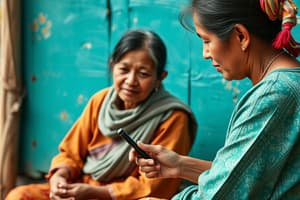Podcast
Questions and Answers
What is the primary purpose of a literature review in the research process?
What is the primary purpose of a literature review in the research process?
- To generate new research questions.
- To provide context and identify gaps in existing research. (correct)
- To collect primary data.
- To test a hypothesis.
Which of the following is NOT a key principle for formulating a good research question?
Which of the following is NOT a key principle for formulating a good research question?
- Clarity
- Feasibility
- Objectivity (correct)
- Specificity
What is the relationship between independent and dependent variables in research?
What is the relationship between independent and dependent variables in research?
- Both variables are manipulated simultaneously to observe their interaction.
- The dependent variable is manipulated to see its effect on the independent variable.
- There is no relationship between independent and dependent variables.
- The independent variable is manipulated to see its effect on the dependent variable. (correct)
Which type of research method primarily relies on numerical data collected through surveys?
Which type of research method primarily relies on numerical data collected through surveys?
When conducting research, what does 'reliability' refer to?
When conducting research, what does 'reliability' refer to?
Which of the following is a key feature of decolonizing methodologies in research?
Which of the following is a key feature of decolonizing methodologies in research?
What is the primary focus of conflict theory in social research?
What is the primary focus of conflict theory in social research?
Which of the following research methodologies is often associated with feminist research?
Which of the following research methodologies is often associated with feminist research?
What is the primary goal of symbolic interactionism as a research approach?
What is the primary goal of symbolic interactionism as a research approach?
Which research method is often used to study social interactions and behaviors within a specific group?
Which research method is often used to study social interactions and behaviors within a specific group?
What is a key distinction between a population and a sample in research?
What is a key distinction between a population and a sample in research?
Which sampling technique involves selecting every nth individual from a list?
Which sampling technique involves selecting every nth individual from a list?
What type of data would be most helpful for studying the impact of sports betting ads on gambling addiction rates?
What type of data would be most helpful for studying the impact of sports betting ads on gambling addiction rates?
What is the primary benefit of using mixed methods in research?
What is the primary benefit of using mixed methods in research?
Which research methodology emphasizes understanding how people create and maintain social order through their interactions?
Which research methodology emphasizes understanding how people create and maintain social order through their interactions?
Which sampling technique allows every member of a population to have an equal chance of being selected?
Which sampling technique allows every member of a population to have an equal chance of being selected?
Which of the following is NOT a key feature of conflict theory in social research?
Which of the following is NOT a key feature of conflict theory in social research?
What is the primary goal of sociological research that involves testing theories through observations?
What is the primary goal of sociological research that involves testing theories through observations?
Which social research method focuses on collecting data to inform policy strategies?
Which social research method focuses on collecting data to inform policy strategies?
Which of the following approaches begins with a theory and uses research to test that theory?
Which of the following approaches begins with a theory and uses research to test that theory?
What type of research aims to describe social reality or provide facts about specific groups?
What type of research aims to describe social reality or provide facts about specific groups?
What is the purpose of the sociological research goal known as 'Debunk'?
What is the purpose of the sociological research goal known as 'Debunk'?
What is the primary goal of stratified sampling?
What is the primary goal of stratified sampling?
Which of the following describes in-depth interviews?
Which of the following describes in-depth interviews?
What is the main characteristic of snowball sampling?
What is the main characteristic of snowball sampling?
What is a distinctive feature of ethnography in research?
What is a distinctive feature of ethnography in research?
What does informed consent entail in human research?
What does informed consent entail in human research?
Which technique is often categorized as a non-probability sampling method in qualitative research?
Which technique is often categorized as a non-probability sampling method in qualitative research?
What is a primary ethical consideration when conducting research with indigenous communities?
What is a primary ethical consideration when conducting research with indigenous communities?
What does secondary data analysis involve?
What does secondary data analysis involve?
Which type of qualitative sampling technique is characterized by selecting participants based on their accessibility and willingness?
Which type of qualitative sampling technique is characterized by selecting participants based on their accessibility and willingness?
What is the main focus of participant observation in field research?
What is the main focus of participant observation in field research?
Flashcards
Social Research Method
Social Research Method
Systematic techniques and strategies used by researchers to collect information.
Goals of Sociological Research
Goals of Sociological Research
The five main goals are enumeration, prediction, explanation, debunking, and social justice.
Deductive Approach
Deductive Approach
Deriving specific observations from general ideas starting with a theory.
Inductive Approach
Inductive Approach
Signup and view all the flashcards
Descriptive Research
Descriptive Research
Signup and view all the flashcards
Research Process
Research Process
Signup and view all the flashcards
Literature Review
Literature Review
Signup and view all the flashcards
Research Question
Research Question
Signup and view all the flashcards
Clarity in Research Questions
Clarity in Research Questions
Signup and view all the flashcards
Specificity in Research Questions
Specificity in Research Questions
Signup and view all the flashcards
Feasibility in Research Questions
Feasibility in Research Questions
Signup and view all the flashcards
Research Design
Research Design
Signup and view all the flashcards
Independent Variable
Independent Variable
Signup and view all the flashcards
Dependent Variable
Dependent Variable
Signup and view all the flashcards
Hypothesis
Hypothesis
Signup and view all the flashcards
Reliability
Reliability
Signup and view all the flashcards
Validity
Validity
Signup and view all the flashcards
Mixed Methods
Mixed Methods
Signup and view all the flashcards
Quantitative Methods
Quantitative Methods
Signup and view all the flashcards
Qualitative Methods
Qualitative Methods
Signup and view all the flashcards
Stratified Sampling
Stratified Sampling
Signup and view all the flashcards
Research Problem
Research Problem
Signup and view all the flashcards
Interviews
Interviews
Signup and view all the flashcards
In-depth Interviews
In-depth Interviews
Signup and view all the flashcards
Semi-structured Interviews
Semi-structured Interviews
Signup and view all the flashcards
Purpose Sampling
Purpose Sampling
Signup and view all the flashcards
Field Research
Field Research
Signup and view all the flashcards
Informed Consent
Informed Consent
Signup and view all the flashcards
Study Notes
Sociological Research Methods
- Social Research Methods: Systematic techniques and strategies for collecting information.
- Ways of Knowing:
- Personal experience
- Tradition
- Authority
- Religion
- Science (controlled, systematic observation)
- 5 Main Goals of Sociological Research:
- Enumeration and Description (e.g., census)
- Prediction (policy analysis)
- Explanation (theories)
- Debunking (challenging common beliefs)
- Social Justice (understanding marginalized groups)
- Theory and Research Cycle:
- Deductive Approach: Deriving specific observations from general ideas. (Theory -> Hypothesis -> Observations -> Generalizations)
- Inductive Approach: Deriving general ideas from specific observations. (Observations -> Generalizations -> Tentative Theory -> Hypothesis -> Observations)
- Basic Concepts of Social Research:
- Descriptive Research: Describes social reality; facts, groups, practices, events.
- Explanatory Research: Explains relationships and reasons for events.
- Independent Variable: Manipulated to explore its effect.
- Dependent Variable: Changes in response to the independent variable.
- Causality: One variable causing a change in another.
Research Process
- Identifying an Area of Study:
- Choosing a topic area
- Understanding previous studies
- Identifying research gaps & questions
- Literature Review:
- Overview of past research
- Understanding previous studies and research gaps
- Clarifying the study's significance.
- Research Questions: Well-defined, answerable questions about a phenomenon.
- Characteristics of good research questions: Clarity, specificity, feasibility.
- Research Design: Blueprint of the study.
- Study type, questions, hypotheses, variables, data collection/analysis, ethics.
- Operationalization: Measuring abstract concepts.
- Variable: Measurable attribute or characteristic.
- Justifying decisions on data collection, populations, and analysis, with ethics in mind.
- Collecting and Analyzing Data:
- Quantitative Methods: Numerical data (surveys).
- Hypotheses: Predictions about relationships between variables.
- Correlation: Measure of association between variables (positive or negative).
- Reliability: Consistency and replicability of findings.
- Validity: Accuracy in representing the real world.
- Statistics: Analysing large quantities of data.
- Qualitative Methods: Non-numerical data (interviews, images).
- Mixed Methods: Combining quantitative and qualitative approaches.
- Benefits of mixed methods: Data triangulation (verifying findings).
- Disadvantages of mixed methods: Time-consuming, multiple data collection methods.
- Quantitative Methods: Numerical data (surveys).
Decolonizing Methodologies, Conflict Theory, Feminism, Functionalism, and Symbolic Interactionism
- Decolonizing Methodologies: Emphasize Indigenous histories, life courses, phenomenology, and cultural sensitivity in research and acknowledging Indigenous histories and cultures.
- Conflict Theory: Examines inequalities in access to resources, power, and privileges with attention to researchers' positions as authority figures and critical reflection.
- Feminism: Investigates inequalities among social groups, experiences of marginalized groups (Black women, Indigenous women, transgender individuals), and different social locations based on background, status, class, etc.
- Functionalism: Examines societal organization and institutions' roles in maintaining order, often relying on quantitative methods.
- Symbolic Interactionism: Studies how people understand the world through interactions and the role of symbols in meaning-making. Often using qualitative methods like participant observation & ethnomethodology.
Survey Research
- Survey Research:
- Used to describe trends, relationships, or analyze a phenomenon.
- Collects data from a population (complete group) using a sample (subset representative of the population).
- Survey Types:
- Self-administered questionnaires
- Researcher-administered questionnaires
- Sampling Techniques:
- Simple random sampling (selection by chance)
- Systematic sampling
- Stratified sampling (proportional representation of categories)
- Quantitative Research Process: Selecting and defining problems, literature review, hypothesis formulation, research design, data collection/analysis, findings and conclusions.
Interviews, Qualitative Sampling, Field Research, Secondary Data Analysis
- Interviews: Conversations with sampled individuals.
- In-depth, unstructured: Flexible interviewing approach.
- Semi-structured: Based on a guide with topics and questions.
- Qualitative Sampling Techniques:
- Purpose sampling (judgmental sampling): Selecting participants based on their characteristics.
- Convenience sampling: Selecting accessible participants.
- Snowball sampling (referral sampling): Participants recruit other participants.
- Field Research: Observation in natural settings (schools, hospitals).
- Participant observation: Researcher observes and participates.
- Ethnography: Researcher fully immerses in a setting.
- Photovoice: Understanding marginalized experiences through participant expression.
- Secondary Data Analysis: Analyzing existing data (written or visual).
- Institutional data (government reports)
- Digital data (e.g., social media).
Ethics of Conducting Human Research
- Ethics: Minimize harm to participants.
- Informed consent: Obtaining permission after providing details about the study.
- Coercion: Avoiding persuasion to participate.
- Indigenous data sovereignty: Respecting Indigenous peoples' control over their data.
Studying That Suits You
Use AI to generate personalized quizzes and flashcards to suit your learning preferences.





